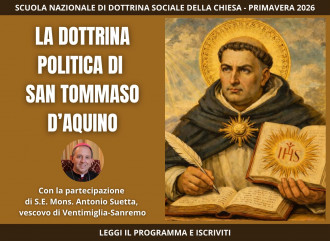Hong Kong: the Catholic-led protest that challenges Beijing
A conversation with Steven Mosher (Population Research Institute) on the events in Hong Kong. "The discontent over Beijing's multiple violations of the Sino-British Agreement has been building for many years. Public anger boiled over with the introduction of the extradition bill, which puts everyone in Hong Kong at risk of being "shanghaied" over the border to China. But even the promised withdrawal of the bill will not resolve the deeper underlying grievances of the Hong Kong people". "The demonstrations were started and led by Hong Kong's Catholics, who are roughly 8 percent of the population. But to this number must be added the many non-Catholic students who attend Hong Kong's many Catholic high schools and colleges".

Professor Mosher, will order be restored in Hong Kong now that the new extradition bill cause of the unrest in Hong Kong has been withdrawn, or the chief executive Carrie Lam’s decision is "too little too late?"
The discontent over Beijing's multiple violations of the Sino-British Agreement has been building for many years. Public anger boiled over with the introduction of the extradition bill, which puts everyone in Hong Kong at risk of being "shanghaied" over the border to China. But even the promised withdrawal of the bill will not resolve the deeper underlying grievances of the Hong Kong people. And it will not assuage their anger and their fear of the one-party dictatorship that threatens to take away their liberties.
Leaked secret recordings of Carrie Lam, Chinese officials and Hong Kong officials reveal the complex relationship between Beijing and Hong Kong. Is Beijing directly controlling Hong Kong’s government?
Yes and no. Carrie Lam was Beijing's handpicked choice to become Hong Kong Chief Executive, so she answers to Beijing rather than to the people. Both she and Beijing officials share a common goal: to end the demonstrations and protests as quickly as possible. Lam wants to do it without shedding blood, I am sure, but her handlers in Beijing have no such compunctions. So while they do not differ over ends, they seem to have a disagreement over means. I believe that, whatever happens, Beijing will removed Lam as soon as the demonstrations end, and then turn around and blame her for the way that they were handled.
The Church in Hong Kong has been very vocal in its support of the protesters (excluding the most radical ones). How strong is Catholic interest in this wave of unrest?
The demonstrations were started and led by Hong Kong's Catholics, who are roughly 8 percent of the population. But to this number must be added the many non-Catholic students who attend Hong Kong's many Catholic high schools and colleges. These are out on the streets as well, joining in the singing of "Alleuia" and "Do you hear the people sing?"
What is the risk of open military repression in Hong Kong, along the lines of Tiananmen?
The people of Hong Kong remember and commemorate the Tiananmen Massacre each year, when tens or even hundreds of thousands take to the streets in a candlelight procession. Such demonstrations are forbidden in China's cities, of course. So Hong Kongers are well aware that their calls for liberty and justice may well be met with violent repression. Indeed, over ten thousand troops have gathered just across the Hong Kong border in Shenzhen, ready to march into the city at any moment and "restore order." But the people of Hong Kong continue to demonstrate anyway.
In your latest book "The Bully of Asia" you described the Chinese "All Under Heaven" the principle of grand unification. Is this compatible with the "Two Systems" solution in the long run?
China's drive for world domination is utterly incompatible with the concept of "One Country, two systems." It is so incompatible, in fact, that China tore up the treaty with the British guaranteeing Hong Kong's separate system in 2017. What surives now is mere pretense--which is exactly why the peole of H.K. are deomonstrating.
Taiwan, like Hong Kong is also waiting for a definitive solution to its status, given that it is only de-facto an independent country and officially still part of Mainland China. Does Taiwan risk the same fate as Hong Kong?
Xi Jinping would like to recover Taiwan by the end of his second term in office in 2022, and then ride that wave of acclamation that follows to a third term. But in order to successfully invade Taiwan, China would have to neutralize the U.S. Seventh Fleet, and mass an invading army of perhaps a million men. Even then, the conflict might last for months, with hundreds of thousands of civilian casualties. Given the long-overdue restoration of the U.S. military by the Trump administration, and the new arms sales that have been approved to Taiwan, I do not think that China will risk taking such an action at this time.
Last but not least: is the unrest in Hong Kong a last desperate, almost futile, attempt to resist Beijing. Do the protesters have any chance of winning this battle?
What stays Beijing's hand is the knowledge that, if they commit a massacre in Hong Kong in plain view of the entire world, it will destroy Hong Kong as a financial center. Companies will flee Hong Kong, real estate prices will plummet, and a trillion dollars in wealth will disappear overnight, including the large sums of money that corrupt Communist officials have invested there. China's effort to expand its influence overseas will be set back by a generation, and the Chinese economy as a whole will suffer. We know that the CCP does not hesitate to imprison, torture, and kill its political enemies, including the demonstrators in Hong Kong. But they would be, as the Chinese saying goes, "Lifting a rock to drop it on one's own feet." So, for the moment, unless the demonstrations spread to other Chinese cities, they are content to wait.




